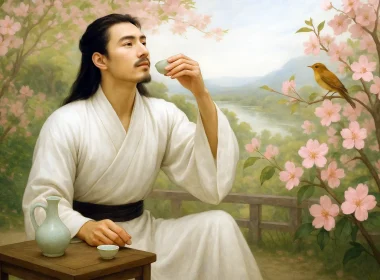Pure wine costs, for the golden cup, ten thousand coppers a flagon,
And a jade plate of dainty food calls for a million coins.
I fling aside my food-sticks and cup, I cannot eat nor drink
I pull out my dagger, I peer four ways in vain.
I would cross the Yellow River, but ice chokes the ferry;
I would climb the T'ai-hang Mountains, but the sky is blind with snow...
I would sit and poise a fishing-pole, lazy by a brook -
But I suddenly dream of riding a boat, sailing for the sun
Journeying is hard,
Journeying is hard.
There are many turnings -
Which am I to follow? ...
I will mount a long wind some day and break the heavy waves
And set my cloudy sail straight and bridge the deep, deep sea.
Original Poem
「行路难 · 其一」
李白
金樽清酒斗十千,玉盘珍羞值万钱。
停杯投箸不能食,拔剑四顾心茫然。
欲渡黄河冰塞川,将登太行雪满山。
闲来垂钓碧溪上,忽复乘舟梦日边。
行路难,行路难!多歧路,今安在?
长风破浪会有时,直挂云帆济沧海。
Interpretation
The three-poem series On the Hard Road was written after Li Bai suffered slander at court and career setbacks. This first poem, composed in 744 AD when departing Chang'an, adopts the Han Dynasty yuefu tradition to express frustration over officialdom's hardships and anguish over unfulfilled ambitions, while showcasing his indomitable spirit. Blending disappointment with hopeful determination, it portrays an unrecognized talent with grand aspirations yet ill-fated destiny.
First Couplet: "金樽清酒斗十千,玉盘珍羞值万钱。"
jīn zūn qīng jiǔ dǒu shí qiān, yù pán zhēn xiū zhí wàn qián.
Gold cups hold fine wine worth thousands; Jade plates bear delicacies priced beyond count.
This couplet depicts extravagant feasting—ostentatious wealth that ironically sets up the poet's melancholy. Luxuries that should delight instead foreshadow coming distress.
Second Couplet: "停杯投箸不能食,拔剑四顾心茫然。"
tíng bēi tóu zhù bù néng shí, bá jiàn sì gù xīn máng rán.
Setting aside cup and chopsticks, I cannot eat; Drawing my sword, gazing blankly in despair.
Facing delicacies, the poet's sorrow kills appetite. "Drawing sword" symbolizes both fury and helplessness—a physical manifestation of his trapped predicament.
Third Couplet: "欲渡黄河冰塞川,将登太行雪满山。"
yù dù huáng hé bīng sè chuān, jiāng dēng tài háng xuě mǎn shān.
To cross Yellow River—ice chokes its flow; To climb Taihang Mountains—snow buries their trails.
Nature's obstacles metaphorize career barriers. Frozen river and snowbound peaks intensify the visceral struggle against immovable adversity.
Fourth Couplet: "闲来垂钓碧溪上,忽复乘舟梦日边。"
xián lái chuí diào bì xī shàng, hū fù chéng zhōu mèng rì biān.
Leisurely fishing by emerald streams, Then suddenly dreaming of sailing to the sun.
Alluding to Jiang Ziya (who fished before aiding kings) and Yi Yin (who dreamt of reaching the sun before advising emperors), these historical parallels reveal lingering hope for recognition—though the dreamlike quality underscores reality's harsh contrast.
Fifth Couplet: "行路难,行路难!多歧路,今安在?"
xíng lù nán, xíng lù nán! duō qí lù, jīn ān zài?
Hard the road, hard the road! So many forks—where now to go?
The climactic repetition of "hard the road" crescendos into existential bewilderment. Multiple life paths amplify the paralyzing uncertainty of choices.
Sixth Couplet: "长风破浪会有时,直挂云帆济沧海。"
cháng fēng pò làng huì yǒu shí, zhí guà yún fān jì cāng hǎi.
Yet winds will part the waves one day—I'll hoist cloud-like sails to cross vast seas!
Quoting the adage "Ride winds to cleave through waves," this defiant coda transforms despair into heroic resolve. The poet's unshaken belief in ultimately overcoming adversity epitomizes Li Bai's romantic idealism.
Overall Appreciation
The poem traces an emotional arc from despondency to triumph. Initial melancholy amid luxury gives way to natural metaphors of obstruction, then historical allusions sustaining hope, before culminating in transcendent determination. This turbulent progression—mirroring Li Bai's resilient character—oscillates between despair and exhilaration, ultimately affirming human perseverance.
Stylistic Features
- Symbolic imagery: "Frozen river" and "snowy peaks" concretize abstract struggles.
- Historical resonance: Jiang Ziya and Yi Yin allusions deepen philosophical weight.
- Dynamic emotional progression: Melancholy → frustration → hope → triumphant resolve.
- Musical rhythm: Mixed 3/5/7-character lines create lyrical cadence.
Insights
Beyond personal grievance, Hard the Road meditates on universal human trials. Li Bai's metaphorical journey—from paralyzed indecision to visionary determination—teaches that adversity's "forked roads" ultimately yield to those who persist. The poem transforms suffering into art, proving how despair, when channeled through creativity, can birth transcendent hope.
Poem translator
Kiang Kanghu
About the poet

Li Bai (李白), 701 - 762 A.D., whose ancestral home was in Gansu, was preceded by Li Guang, a general of the Han Dynasty. Tang poetry is one of the brightest constellations in the history of Chinese literature, and one of the brightest stars is Li Bai.












